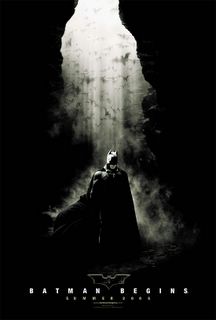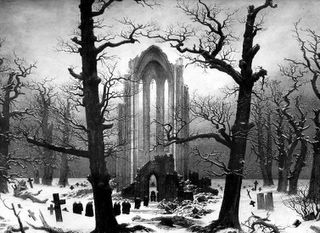The madman jumped into their midst and pierced them with his eyes. "Whither is God?" he cried; "I will tell you. We have killed him—you and I... But how did we do this? How could we drink up the sea? Who gave us the sponge to wipe away the entire horizon? What were we doing when we unchained the earth from the sun? Whither are we moving?... Are we not straying through an infinite nothing? Do you not feel the breath of empty space? Do we hear nothing as yet of the noise of the gravediggers who are burying God? Do we smell nothing as yet of the divine decomposition? Gods, too, decompose. God is dead... And we have killed him.
How shall we comfort ourselves...? What festivals of atonement, what sacred games shall we have to invent? Is not the greatness of the deed too great for us? Must we ourselves not become gods simply to appear worthy of it?"Nietzsche
"Method of this work: literary montage. I need say nothing. Only show." --- Walter Benjamin
Monday, February 28, 2005
Today
Live to the point of tears.
Albert Camus
French existentialist author & philosopher (1913 - 1960)
Albert Camus
French existentialist author & philosopher (1913 - 1960)
Saturday, February 26, 2005
I wouldn't want to fade
I wouldn't want to fade
Without someone inventing
Eternal roses
The two hour day
The sea at the mountain
The mountain at the sea
The end of pain
Newspapers in color
All children happy
And so many other tricks
That sleep inside the brains
Of genius engineers
Of jovial gardeners
Of concerned socialists
Of urban urbanists
And of thoughtful thinkers
So many things to see
To see and to hear
So much time to wait
Searching in the dark
And me I see the end
It swarms and it comes closer
With its ugly face
And it opens its arms to me
Like a cripplety frog
I wouldn't want to die
No sir no madam
Before having tested
The taste which torments me
The taste which is the strongest
I wouldn't want to die
Before having tasted
The flavour of death...Boris Vian
Without someone inventing
Eternal roses
The two hour day
The sea at the mountain
The mountain at the sea
The end of pain
Newspapers in color
All children happy
And so many other tricks
That sleep inside the brains
Of genius engineers
Of jovial gardeners
Of concerned socialists
Of urban urbanists
And of thoughtful thinkers
So many things to see
To see and to hear
So much time to wait
Searching in the dark
And me I see the end
It swarms and it comes closer
With its ugly face
And it opens its arms to me
Like a cripplety frog
I wouldn't want to die
No sir no madam
Before having tested
The taste which torments me
The taste which is the strongest
I wouldn't want to die
Before having tasted
The flavour of death...Boris Vian
Friday, February 25, 2005
His announcement of the death of God
"My first dose of Nietzsche shocked me profoundly. In black and white he had had the audacity to affirm: 'God is dead!' What? I had just learned that God did not exist, and now someone was informing me that he had died."Salvador Dali in Diary of a Genius, 1966
Thursday, February 24, 2005
Wednesday, February 23, 2005
Pope likens abortion to Holocaust
The Catholic Church does not understand or does not want to understand that there is an enormous difference between mass genocide and what women do with their bodies Paul Spiegel
German Central Council for Jews
German Central Council for Jews
Tuesday, February 22, 2005
Sunday, February 20, 2005
Simple
My loathings are simple: stupidity, oppression, crime, cruelty, soft music.
Vladimir Nabokov (1899 - 1977)
Vladimir Nabokov (1899 - 1977)
Monday, February 14, 2005
February 14
There were the roses, in the rain.
Don't cut them, I pleaded.
They won't last, she said.
But they're so beautiful
where they are.
Agh, we were all beautiful once, she said,
and cut them and gave them to me
in my hand.William Carlos Williams
Don't cut them, I pleaded.
They won't last, she said.
But they're so beautiful
where they are.
Agh, we were all beautiful once, she said,
and cut them and gave them to me
in my hand.William Carlos Williams
Sunday, February 13, 2005
Mistaken Identity
If at times I have felt happy, then this has been largely due to a mistaken identity: on those occasions I regarded myself as someone other than who I am. Schopenhauer, 1823
Saturday, February 12, 2005
Friday, February 11, 2005
Wednesday, February 09, 2005
Tuesday, February 08, 2005
What I'm reading
The philosophy of love
Abelard and Heloise were the smartest people of the 12th century - and the most passionate.
Abelard and Heloise were the smartest people of the 12th century - and the most passionate.
Monday, February 07, 2005
Sunday, February 06, 2005
God
No more things should be presumed to exist than are absolutely necessary.
William of Ockham (c.1280-1349) Medieval English Philosopher
William of Ockham (c.1280-1349) Medieval English Philosopher
A Little Observation
When did I realize I was God? Well, I was praying and suddenly realized that I was talking to myself.
Fathers
Our fathers were our models for God. If our fathers bailed, what does that tell you about God? Listen to me! You have to consider the possibility that God does not like you. He never wanted you. In all probability, he hates you. This is not the worst thing that can happen.....We don't need him.....Fuck damnation, man. Fuck redemption. We are God's unwanted children. So be it! David Fincher- Fight Club
Saturday, February 05, 2005
Pensees 203
That passion may not harm us, let us act as if we had only eight hours to live.
Pascal, Pensees 203A question to ponder: If you knew your death was imminent, how would you spend your last eight hours on earth?
Pascal, Pensees 203A question to ponder: If you knew your death was imminent, how would you spend your last eight hours on earth?
A good nights sleep
The thought of suicide is a powerful solace: a means to get through many a bad night.Nietzsche
Friday, February 04, 2005
book-of-the-month
Death Desire and Loss in Western Culture
by Jonathan Dollimore
The German thinker Arthur Schopenhauer once said that "without death there would hardly have been any philosophizing." Dollimore attests to this thought in his engaging study of death and its corresponding link to desire. In presenting funereal discourses of thinkers, writers, poets, and other literati throughout the ages, he offers a substantial contribution to Western intellectual history. As he examines the conversations between philosophers and writers, beginning with the pre-Socratics and finishing with postmodern theorists, his findings prove interesting--death has always been linked to desire in Western culture. He touches upon the work of almost every conceivable thinker: Heraclitus and Camille Paglia, Machiavelli and Marx, Shakespeare and Wagner, and, of course, the venerable Foucault. He concludes with a study of homoeroticism and AIDS, perhaps the most poignant modern example of desire linked with death. Although a little shaky on facts that are not within his usual academic milieu, and despite some antiquated bibliographic sources, Dollimore presents a marvelous, enrapturing, and accessible work for both the scholar and the armchair philosopher. Michael Spinella-From Booklist
by Jonathan Dollimore
The German thinker Arthur Schopenhauer once said that "without death there would hardly have been any philosophizing." Dollimore attests to this thought in his engaging study of death and its corresponding link to desire. In presenting funereal discourses of thinkers, writers, poets, and other literati throughout the ages, he offers a substantial contribution to Western intellectual history. As he examines the conversations between philosophers and writers, beginning with the pre-Socratics and finishing with postmodern theorists, his findings prove interesting--death has always been linked to desire in Western culture. He touches upon the work of almost every conceivable thinker: Heraclitus and Camille Paglia, Machiavelli and Marx, Shakespeare and Wagner, and, of course, the venerable Foucault. He concludes with a study of homoeroticism and AIDS, perhaps the most poignant modern example of desire linked with death. Although a little shaky on facts that are not within his usual academic milieu, and despite some antiquated bibliographic sources, Dollimore presents a marvelous, enrapturing, and accessible work for both the scholar and the armchair philosopher. Michael Spinella-From Booklist
a self-portrait
large aquiline nose,sunken eyes,heavily browed,gloomy countenance...like an undertaker on holiday...face cadaverous,sepulchral...doom-driven,a romantics melancholy...a wracked soul bearing the sorrow and pain of the ages.
My Revenge
"Everyone takes his revenge on the world. My revenge consists in bearing my distress and anguish enclosed deeply within me while my laughter entertains everyone. If I see someone suffer I give him my sympathy, console him as best I can, and listen to him calmly when he assures me that I am fortunate. If I can only keep this up until the day I die I shall have had my revenge."
~Source: The Journals (1837)
Author: Søren Kierkegaard
~Source: The Journals (1837)
Author: Søren Kierkegaard
thought-of-the-day
"If I were to begin life again, I should want it as it was. I would only open my eyes a little bit more." - Jules Renard
Good Coffee
"I went out to the coffeehouse, where on the previous visit I went every day to enjoy the drink which according to the words of the poet, if it is '...pure and warm and strong and not abused,' can be placed alongside that with which the poet compares it, namely 'friendship.' I insist at least upon good coffee."
~Source: Repetition: An Essay In Experimental Psychology (1843)
Author: Søren Kierkegaard using the pseudonym Constantin Constantius
~Source: Repetition: An Essay In Experimental Psychology (1843)
Author: Søren Kierkegaard using the pseudonym Constantin Constantius
The Project
In the spirit of Walter Benjamin The Arcades Project this blog will mostly consist of quotations and excerpts from books that I'm currently reading or have read.Topics will range from life and death, philosophy, history, boredom, melancholy and everything in between.
Subscribe to:
Comments (Atom)








